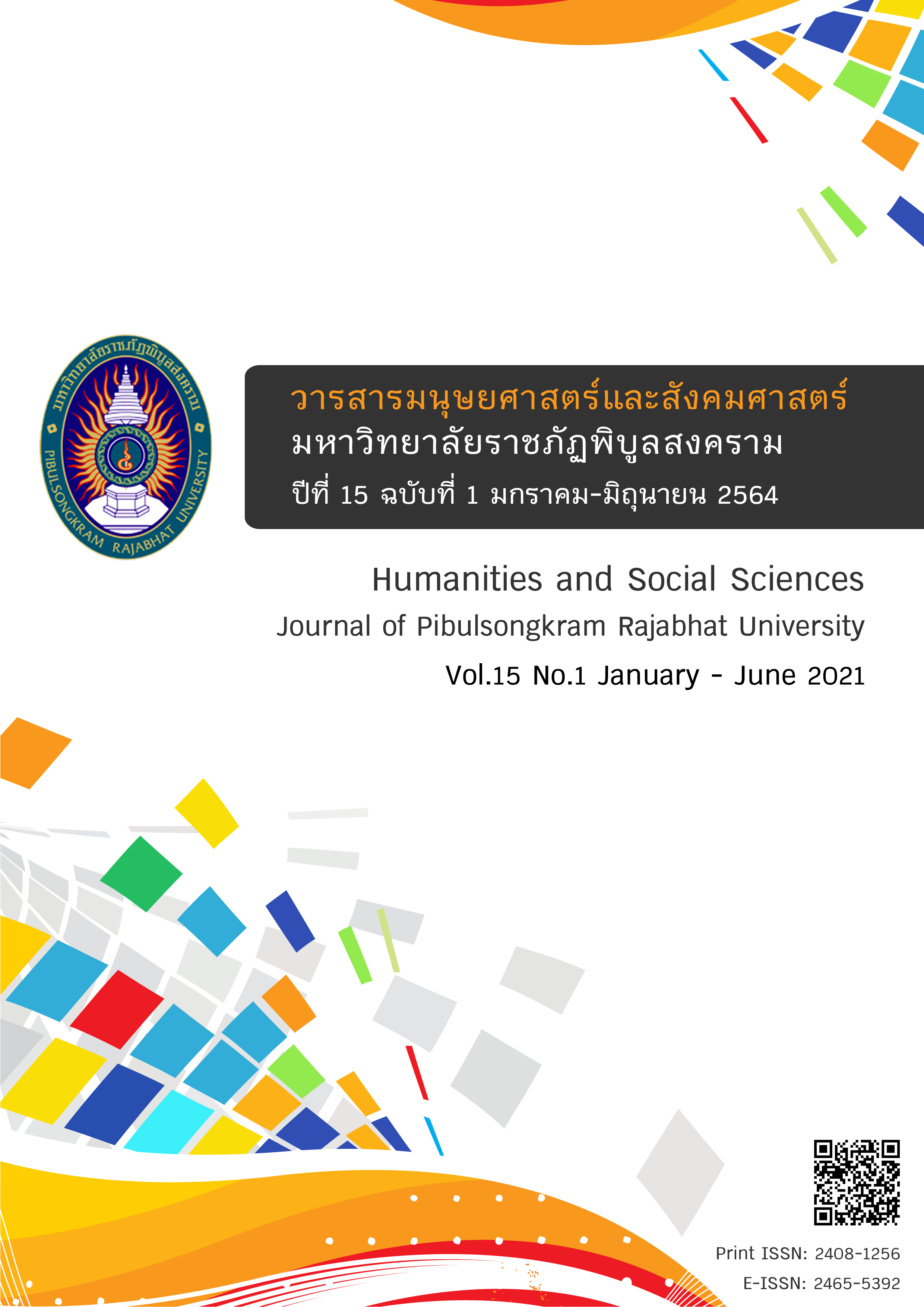The Development of a Set of Local Science Activities on the Diversity of Indigenous Knowledge to Promote the Ability to Perform Notable Activities in the Association of Young Scientists of 6th Grade Students
DOI:
https://doi.org/10.14456//psruhss.2021.20Keywords:
Local Wisdom, Scientific Activity Module, Young Scientists ClubAbstract
The purposes of the research were to 1) to study and develop a set of science and indigenous knowledge activities that promote notable activities in the young scientists association 2) to study the development of scientific process skills after using science activity sets and indigenous knowledge of 6th grade students and 3) study ability the notable activities in the young scientists association after using local science activity sets. The sample group in this research was the 60, 6th grade students, academic year 2019, Santisuksa School. Materials used to collect data were 1) science activity set with indigenous knowledge, 2) science process skill test, and 3) assessment form for ability to perform notable activities in 6th grade students. Analyzed data by using descriptive statistics such as; 1) average ( ), 2) percentage (%) and
3) standard deviation (S.D.). The research found that, 1) science activity set with indigenous knowledge; the subject is diversity in indigenous knowledge 6th grade students and it had the efficiency of E1 / E2 at 87.20 / 83.30 which is higher than the standard set by using a 80/80 criteria. 2) The achievement in the science process skill development of students after teaching by using activity packages had a higher scores after studying at the statistical significance of 0.01 and, 3) the 6th grade students had the ability to perform notable activities in the young scientists association of each group of students, 2 groups of students had the ability to perform notable activities in the young scientists association at an excellent level, and another 4 groups had the ability to perform notable activities in the young scientists association at a good level.
References
กระทรวงศึกษาธิการ. (2542).พระราชบัญญัติการศึกษาแห่งชาติพุทธศักราช 2542 และแก้ไขเพิ่มเติม (ฉบับที่ 2) พ.ศ. 2545. กรุงเทพฯ: คุรุสภาลาดพร้าว.
กระทรวงศึกษาธิการ. (2542). การจัดการเรียนการสอนที่เน้นผู้เรียนเป็นศูนย์กลางในเอกสารชุดแนวทางปฏิรูปการศึกษาในโรงเรียนสังกัดกรมสามัญศึกษา. กรุงเทพฯ: การศาสนา.
กระทรวงศึกษาธิการ. (2551). ตัวชี้วัดและสาระการเรียนรู้แกนกลาง กลุ่มสาระการเรียนรู้สังคมศึกษา ศาสนา และวัฒนธรรม ตามหลักสูตรแกนกลาการศึกษาขั้นพื้นฐานพุทธศักราช 2551. กรุงเทพฯ: กระทรวงศึกษาธิการ.
กฤษณีย์ ปิตุรัตน์. (2548). ผลของการใช้ชุดฝึกเพื่อส่งเสริมความสามาถในการทำโครงงานวิทยาศาสตร์ที่พัฒนามาจากภูมิปัญญาท้องถิ่นของนักเรียนระดับชั้นมัธยมศึกษาตอนปลาย จังหวัดแม่ฮ่องสอน. เชียงใหม่: มหาวิทยาลัยเชียงใหม่.
จิตรลดา เกิดเรือง. (2548). การพัฒนาหลักสูตรสถานศึกษา เรื่อง ประเพณีและพิธีกรรมไทยทรงดํา
สําหรับนักเรียนชั้นประถมศึกษาปี ที่ 5 จังหวัดสุพรรณบุรี (วิทยานิพนธ์ศึกษาศาสตรมหาบัณฑิต). มหาวิทยาลัยศิลปากร, กรุงเทพฯ.
ชาตรี เกิดธรรม. (2542). การเรียนการสอนวิทยาศาสตร์เน้นนักเรียนเป็นศูนย์กลาง. กรุงเทพฯ: เซ็นเตอร์ดิสคัพเวอรี่.
ทิศนา แขมมณี. (2553). ศาสตร์การสอน : องค์ความรู้เพื่อการจัดกระบวนการเรียนรู้ที่มีประสิทธิภาพ. กรุงเทพฯ: ด่านสุทธาการพิมพ์.
นาตยา ช่วยชูเชิด. (2557). การศึกษาผลสัมฤทธิ์ทางการเรียนและความสามารถในการคิดแก้ปัญหาทางวิทยาศาสตร์ของนักเรียนชั้นมัธยมศึกษาปีที่ 2 ที่ได้รับการสอนโดยใช้ชุดกิจกรรมวิทยาศาสตร์ วารสารศรีนครินทรวิโรฒวิจัยและพัฒนา (สาขามนุษยศาสตร์และสังคมศาสตร์), 6(12), 87-94.
นิตยา บุญตัน. (2541). ผลการใช้แบบฝึกเพื่อส่งเสริมการคิดหัวข้อและการทำโครงงานวิทยาศาสตร์ ของนักเรียนระดับมัธยมศึกษาตอนต้น. เชียงใหม่: มหาวิทยาลัยเชียงใหม่.
มนตรี โคตรคันทา. (2550). ภูมิปัญญาอีสาน สะออนอีสาน วิถีชีวิต ศิลปวัฒนธรรม และภาษาอีสาน. สืบค้น
ธันวาคม 2551, จาก http://www.isangate.com/local/knowledge.html
รายงานประจำปี สมศ. (2550). สืบค้น 9 กุมภาพันธ์ 2560, จาก http://www.onesqa.or.th/th/download/906/
แรมสมร อยู่สถาพร. (2551). เทคนิคและวิธีสอนในระดับประถมศึกษา. กรุงเทพฯ: จุฬาลงกรณ์มหาวิทยาลัย.
ยุรธร จีนา และวิภาดา ญาณสาร. (2555). การใช้กิจกรรมโครงงานภูมิปัญญาล้านนาในรายวิชาเศรษฐกิจพอเพียงเพื่อการพัฒนาที่ยั่งยืน สำหรับนักศึกษาระดับปริญญาตรีมหาวิทยาลัยเทคโนโลยีราชมงคลล้านนา. วารสารวิชาการและวิจัย มทร.พระนคร, 6(ฉบับพิเศษ), 1-11.
วนัชภรณ์ ปึ่งพรม และกัญญารัตน์ โคจร. (2561). การพัฒนาชุดกิจกรรมการเรียนรู้ทักษะการอ่านจับใจความภาษาอังกฤษตามแนวคิดสมองเป็นฐานชั้นมัธยมศึกษาปีที่ 1. วารสารวิชาการแพรวากาฬสินธุ์ มหาวิทยาลัยกาฬสินธุ์, 5(1), 93–109.
วิชัย วงษ์ใหญ่. (2542). กระบวนทัศน์ใหม่ : การจัดการศึกษาเพื่อพัฒนาศักยภาพ. กรุงเทพฯ: คณะศึกษาศาสตร์ มหาวิทยาลัยศรีนครินทรวิโรฒ.
วีระพงษ์ แสง-ชูโต. (2552). การวิเคราะห์ภูมิปัญญาท้องถิ่นและเทคโนโลยีพื้นบ้านทางวิทยาศาสตร์ในภาคเหนือตอนบนของประเทศไทย (วิทยานิพนธ์ปริญญาดุษฎีบัณฑิต). มหาวิทยาลัยศรีนครินทรวิโรฒประสานมิตร, กรุงเทพฯ.
สุมน อมรวิวัฒน์. (2541). ทําไมต้องปฏิรูปการเรียนรู้. ใน เอกสารประกอบการนําเสนอแนวคิดและแนวทาง เรื่อง “การปฏิรูปการเรียนรู้ตามแนวคิด 5 ทฤษฎี”. กรุงเทพฯ: สํานักงานคณะกรรมการศึกษาแห่งชาติ.
สายชล รื่นรวย. (2556). การพัฒนาชุดกิจกรรมการทำโครงงานวิทยาศาสตร์ สำหรับชั้นมัธยมศึกษาปีที่ 2. วารสารการศึกษาและการพัฒนาสังคม, 9(1),145–153.
สถาบันส่งเสริมการสอนวิทยาศาสตร์และเทคโนโลยี. (2545). การจัดสาระการเรียนรู้กลุ่มวิทยาศาสตร์ หลักสูตรการศึกษาขั้นพื้นฐาน. กรุงเทพฯ: สถาบันส่งเสริมการสอนวิทยาศาสตร์และเทคโนโลยี.
สำนักงานคณะกรรมการการศึกษาแห่งชาติกระทรวงศึกษาธิการ. (2559). การวัดและประเมินผลตามสภาพที่แท้จริงของนักเรียน. กรุงเทพฯ: คุรุสภาลาดพร้าว.
อาภรณ์ ใจเที่ยง. (2546). หลักการสอน (พิมพ์ครั้งที่ 3). กรุงเทพฯ: โอเดียนสโตร์
อัญชลี เหล่ารอด. (2554). ผลการพัฒนาทักษะกระบวนการทางวิทยาศาสตร์ขั้นพื้นฐานของนักเรียมัธยมศึกษา ปีที่ 3 โดยใช้คำถามควบคู่กับการจัดการเรียนรู้กลุ่มสาระการเรียนรู้วิทยาศาสตร์. กรุงเทพฯ: มหาวิทยาลัยศรีนครินทรวิโรฒ.
Bloom, B. S. (1956). Taxonomy of Educational Objectives, the classification of educational goals–Handbook I: Cognitive Domain. New York: McKay.
Budnitz, N. (2003). What do We Mean by Inquiry?. Retrieved from http://www.biology.duke.edu/cibl/inquiry/what_is_inquiry.htm
Rivet, A. E., & Krajcik, J. S. (2007). Contextualizing instruction: Leveraging students' prior knowledge and experiences to foster understanding of middle school science. Journal of Research in Science Teaching, 45(1), 79-100.
Downloads
Published
How to Cite
Issue
Section
License
Any articles or comments appearing in the Journal of Humanities and Social Sciences, Rajabhat Phibulsongkram University, are the intellectual property of the authors, and do not necessarily reflect the views of the editorial board. Published articles are copyrighted by the Journal of Humanities and Social Sciences, Rajabhat Phibulsongkram University.









